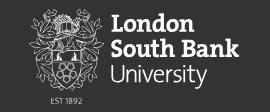About Hospitality Leadership In Universities And The Public Sector MA in London South Bank University (LSBU)
This unique course is specifically for those supplying hospitality services to universities and public sector organisations such as hospitals, schools, colleges and prisons. Unlike most of the private sector caterers, these organisations have a loyal and long serving work force, and this degree is aimed at helping that workforce develop and grow their careers.
We take as our philosophy that ‘catering is not an appendage but an integral part of an organisation’s product and culture and, therefore, has an important role to play in helping that organisation achieve its corporate goals and establish an effective working culture.’ Staff need to be engaged with the wider organisation, enabled and empowered to be entrepreneurial and creative and be on top of the latest trends in food and residential services. To this end, students will share their good practice and insights from their working environment with each other and undertake a comparative residential study visit.
The hospitality industry is a demanding industry and the block system will permit students to be able to plan their work life one year in advance as the teaching dates have been confirmed for from January to December 2019.
Why Hospitality Leadership at LSBU?
Partnered with The University Caterers Organisation in the creation of this degree.
Innovative delivery in blocks rather than semester-based delivery. This innovative delivery will provide the opportunity for those people in full-time employment to study.
Our research-active staff bring their expertise to your learning – we were ranked number one in London for Research Quality in ‘Hospitality, Leisure, Recreation and Tourism’. (Complete University Guide, 2018).
Where better to study than the middle of London – the world capital of hospitality.
- A minimum of five years’ experience of working in hospitality, or hospitality-related organisations (for example in the health or school sector), in a professional hospitality capacity. This may include a range of roles at a senior level but is unlikely to include experience that is solely administrative unless this is at a senior level and the applicant has experience of staff management. Candidates may have experience of in-house teams and / or outsourced teams but must have worked in the public service environment.
- International students additionally require an English Language qualification, with an IELTS score of 6.5, or equivalent.
London South Bank University (LSBU) Highlights
| University Type |
Public University |
| Campus Setting |
Urban |
| Establishment Year |
1992 |
| No. of Schools |
7 |
| No. of Campuses |
2 |
| No. of Residences |
4 |
| Graduate Job Rate |
89% |
| Student-Teacher Ratio |
17:1 |
| External Income |
£2 million |
| Cost of Attendance |
£14,780 |
| Applications Accepted |
Online |
| Work-Study |
Not available |
| Intake Months |
January and September |
| Mode of Program |
Classroom and online |
London South Bank University Average Tuition Fees And Other Expenses
| Course |
Tuition Fee |
| Undergraduate |
£13,780 |
| MSc; MA; PG Diploma |
£13,780 |
| MBA |
£15,100 |
| MPhil; PhD |
£13,780 |
The weekly cost of living for students living in hostel accommodation and private accommodation is, respectively, £206–356 and £225–515.
London South Bank University Admission Process
- Application: The international students may apply by filling the LSBU application form. In absence of the preferred course in the list, UG and PG students may apply, respectively, via ‘UCAS’ and ‘UKPASS’.
- Application deadline:
UG Courses: January 15 (UCAS); June 30 (UCAS Extra)
PG Courses: There is no fixed closing date for PG courses.
- General requirements: Academic transcripts, official degree completion certificate, English language certificate.
- Additional requirements: Passport copy, current visa, 2 academic references with official stamp, research proposal (PG research students), CV.
- English Proficiency Test: The students need to demonstrate English language proficiency through the tests given below.
| Test |
UG |
PG |
| IELTS |
6.0 |
6.5 |
| PTE Academic |
52 |
60 |
| GCSE/O-Level/IGCSE |
Grade C |
Grade C |
| Cambridge English: Advanced |
Grade C |
Grade C |

